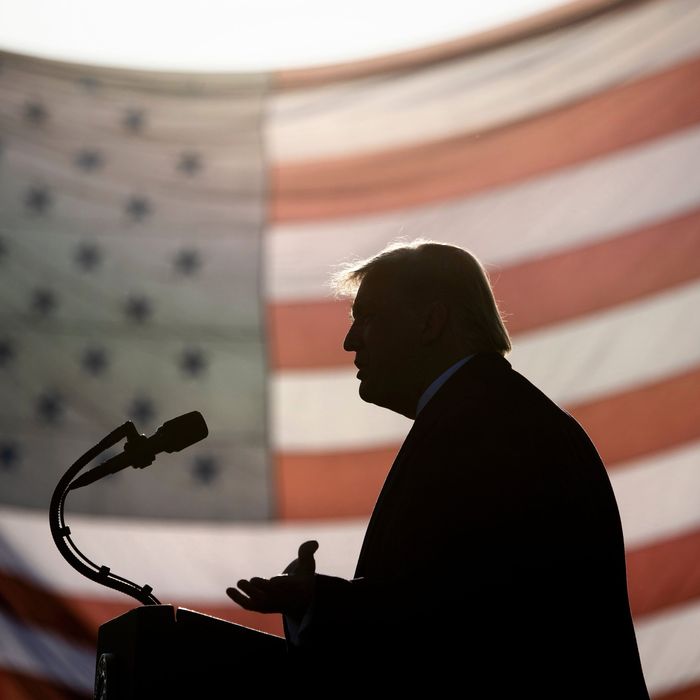
The United States has survived the 2020 election and its seemingly never-ending and increasingly bizarre aftermath. Efforts by Donald Trump to overturn Joe Biden’s victory in the courts met abject failure at almost every turn even as a number of Republican elected officials and Republican voters embraced them. The most apocalyptic scenarios that some scholars worried about before the election did not come to pass. But nothing that happened after November 3 can be considered normal — not the threats to election officials, not the concerted legal effort to invalidate millions of votes, and certainly not Four Seasons Total Landscaping.
Some prominent academic figures who study how countries fall into dictatorships are deeply concerned about what would come next.
Daniel Ziblatt, a political science professor at Harvard and the co-author of How Democracies Die, told Intelligencer, “I think it’s pretty clear that there was a somewhat serious effort to steal this election. It’s not going to succeed. In that sense, the acute normative crisis has passed. It doesn’t mean our checks and balances have worked.” He pointed to what he described as “a chronic slow burning problem” within the American electorate, the “radicalization” within the Republican Party. “One can’t have a democracy [in a two party system] where one of the two parties is not fully committed to democratic norms.” Ziblatt described the current situation as an escalation of constitutional hardball, where political actors “sniff out weakness in constitutional structure,” violating long-standing norms if not technically the law. He pointed to the Trump-led effort in 2020 to have Republican-controlled state legislatures pick their own electors to throw victory to the president, regardless of how their states voted.
The possibility of a step like this was always embedded within the constitutional structure, but no one, until now, had been willing to explicitly overturn the results of a presidential election that already had a clear and decisive winner.
“I worry that this whole post-election process has been the dress rehearsal,” said Harvard political scientist Steven Levitsky, the other co-author of How Democracies Die, citing Vladimir Lenin’s quote that the Russian Revolution of 1905 was the “dress rehearsal” for the October Revolution of 1917, which put the Bolsheviks in power. Levitsky noted that not only have Republicans found that “their base won’t punish this sort of behavior, they’ll likely applaud it.” He added, “none of this stuff can be unlearned.”
Experts weren’t comforted by the slapstick nature of Trump campaign’s efforts to overturn the election, ranging from farcical conspiratorial claims to the hair dye dripping down Rudy Giuliani’s cheeks. “I think we do make a mistake that authoritarians are always as competent at the time as they appear in retrospect,” said Ziblatt. “Mussolini was a clown. Hitler was very lazy. It’s not as if they are always paragons of self-discipline and organization.”
These two scholars both expressed real concerns about what they see as structural flaws in our current system — flaws that allow a political party, in this case, the Republican Party, to consistently win power despite failing to win a plurality of the vote (as Trump did in 2016). This undercuts the idea of a self-correcting two-party system where, as Ziblatt put it, “If one party goes off the rails, it will be punished at the ballot box.”
Not everything went wrong, though. As Joshua Tucker, a professor at New York University and co-director of NYU’s Center for Social Media and Politics put it “the good news … is the amount of violence that occurred around this election was totally negligible.” He noted this is not the case in fragile democracies where polling stations are blown up, election workers are shot, and people are physically harmed while counting votes. Compared to scenarios as dire as those, the United States looks good. Tucker also noted the separation of powers held. “The people who work in the judicial branch do not see their role as ratifying the wishes of whoever runs the executive branch.” He noted that it wasn’t simply a situation where there were enough judges appointed by Democrats to throw out Trump’s lawsuits. Instead, Republican-appointed federal judges up to the Supreme Court — including those appointed by Trump himself — repeatedly ruled against him.
Yet the question remains as to whether these guardrails will last. Levitsky argued that in “most other cases [in other countries], where parties have gone off the rails or where parties have gone bad, they’ve turned to the military. They’ve turned to more directly authoritarian means. We don’t have many cases of a party that becomes authoritarian but continues to operate in a fully democratic system.”
The closest American parallel he saw was Southern Democrats in the Jim Crow era whom he characterized as authoritarian because of “a process of constitutional coups [in the last quarter of the 19th century] … legislating changes which enabled the disenfranchisement of nearly half of the population.”
The question is what the future of American democracy looks like with the specter of Trump in exile at Mar-a-Lago, still falsely claiming fraud. “All Trump has on his side is his base,” said Valerie Bunce, a political scientist at Cornell. “That is the currency of his power, and he will hold on to it as much possible.” The question is whether Trump’s base will still pay attention to him after he leaves office — the answer will affect how future generations view him and this episode. Ziblatt noted that “this really hinges on political elites telling the history in a way that teaches future generations that this was a travesty or a mistake … political leaders can tell alternative stories and honestly confront the past.” For Ziblatt, the analogy in American history was to Joseph McCarthy, who became anathema only years after he dominated Washington, D.C., with his demagogic anti-communist crusade. Today his name is an insult. This scenario was the most optimistic one possible proffered by any of the experts. However, McCarthy’s downfall happened in an entirely different era when the Republican Party eventually turned him into a pariah.
The alternative scenario proffered is that if false claims of a stolen election will persist like the “stab in the back” myth after World War I in Germany, which wrongfully suggested that democratic politicians had betrayed the army and prevented victory. “This has the result of weakening the regime because it just lowers the legitimacy among large sections of the electorate,” Zilbatt said. “The Weimar Republic had a period of democratic vibrancy and overcame some of these weaknesses, but it continued to linger. This kind of doubt often persists.”
Overall, Levitsky noted that we don’t have “too many parallels” for the present situation. The United States, he thought, would avoid civil war like Spain in the 1930s and a situation like Venezuela or Turkey where “one side gains hegemony and crushes the other.” Instead, he said, the United States is “stuck with two relatively evenly matched sides, one side weaker but advantaged by institutions and more aggressively authoritarian.” Further, he thought the most historically common outcome — military intervention — is just not going to happen.
Instead, the United States is “headed to a medium term of dysfunction and careening in and out of institutional crisis” in a situation without any historical parallel, he said, adding that “stability and dysfunction are a rare combination.”
The Link LonkDecember 27, 2020 at 09:00PM
https://ift.tt/3hjTnWF
Is Trump’s Coup a ‘Dress Rehearsal?’ - New York Magazine
https://ift.tt/2KksXom
Dress

No comments:
Post a Comment